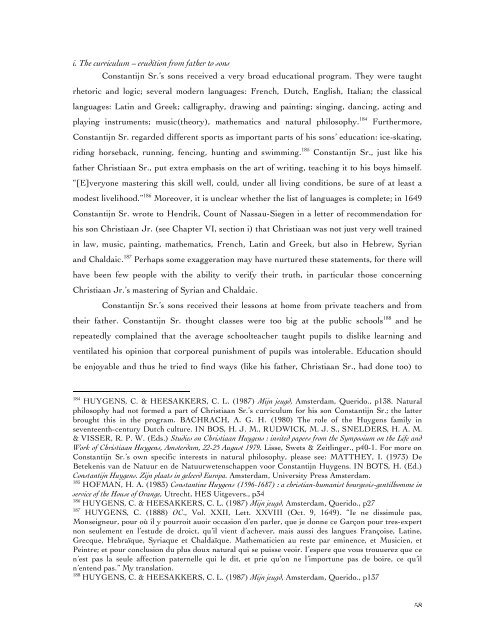Christiaan Huygens – A family affair - Proeven van Vroeger
Christiaan Huygens – A family affair - Proeven van Vroeger
Christiaan Huygens – A family affair - Proeven van Vroeger
Create successful ePaper yourself
Turn your PDF publications into a flip-book with our unique Google optimized e-Paper software.
i. The curriculum <strong>–</strong> erudition from father to sons<br />
Constantijn Sr.’s sons received a very broad educational program. They were taught<br />
rhetoric and logic; several modern languages: French, Dutch, English, Italian; the classical<br />
languages: Latin and Greek; calligraphy, drawing and painting; singing, dancing, acting and<br />
playing instruments; music(theory), mathematics and natural philosophy. 184 Furthermore,<br />
Constantijn Sr. regarded different sports as important parts of his sons’ education: ice-skating,<br />
riding horseback, running, fencing, hunting and swimming. 185 Constantijn Sr., just like his<br />
father <strong>Christiaan</strong> Sr., put extra emphasis on the art of writing, teaching it to his boys himself.<br />
“[E]veryone mastering this skill well, could, under all living conditions, be sure of at least a<br />
modest livelihood.” 186 Moreover, it is unclear whether the list of languages is complete; in 1649<br />
Constantijn Sr. wrote to Hendrik, Count of Nassau-Siegen in a letter of recommendation for<br />
his son <strong>Christiaan</strong> Jr. (see Chapter VI, section i) that <strong>Christiaan</strong> was not just very well trained<br />
in law, music, painting, mathematics, French, Latin and Greek, but also in Hebrew, Syrian<br />
and Chaldaic. 187 Perhaps some exaggeration may have nurtured these statements, for there will<br />
have been few people with the ability to verify their truth, in particular those concerning<br />
<strong>Christiaan</strong> Jr.’s mastering of Syrian and Chaldaic.<br />
Constantijn Sr.’s sons received their lessons at home from private teachers and from<br />
their father. Constantijn Sr. thought classes were too big at the public schools 188 and he<br />
repeatedly complained that the average schoolteacher taught pupils to dislike learning and<br />
ventilated his opinion that corporeal punishment of pupils was intolerable. Education should<br />
be enjoyable and thus he tried to find ways (like his father, <strong>Christiaan</strong> Sr., had done too) to<br />
184 HUYGENS, C. & HEESAKKERS, C. L. (1987) Mijn jeugd, Amsterdam, Querido., p138. Natural<br />
philosophy had not formed a part of <strong>Christiaan</strong> Sr.’s curriculum for his son Constantijn Sr.; the latter<br />
brought this in the program. BACHRACH, A. G. H. (1980) The role of the <strong>Huygens</strong> <strong>family</strong> in<br />
seventeenth-century Dutch culture. IN BOS, H. J. M., RUDWICK, M. J. S., SNELDERS, H. A. M.<br />
& VISSER, R. P. W. (Eds.) Studies on <strong>Christiaan</strong> <strong>Huygens</strong> : invited papers from the Symposium on the Life and<br />
Work of <strong>Christiaan</strong> <strong>Huygens</strong>, Amsterdam, 22-25 August 1979. Lisse, Swets & Zeitlinger., p40-1. For more on<br />
Constantijn Sr.’s own specific interests in natural philosophy, please see: MATTHEY, I. (1973) De<br />
Betekenis <strong>van</strong> de Natuur en de Natuurwetenschappen voor Constantijn <strong>Huygens</strong>. IN BOTS, H. (Ed.)<br />
Constantijn <strong>Huygens</strong>. Zijn plaats in geleerd Europa. Amsterdam, University Press Amsterdam.<br />
185 HOFMAN, H. A. (1983) Constantine <strong>Huygens</strong> (1596-1687) : a christian-humanist bourgeois-gentilhomme in<br />
service of the House of Orange, Utrecht, HES Uitgevers., p34<br />
186 HUYGENS, C. & HEESAKKERS, C. L. (1987) Mijn jeugd, Amsterdam, Querido., p27<br />
187 HUYGENS, C. (1888) OC., Vol. XXII, Lett. XXVIII (Oct. 9, 1649). “Ie ne dissimule pas,<br />
Monseigneur, pour où il y pourroit auoir occasion d’en parler, que je donne ce Garçon pour tres-expert<br />
non seulement en l’estude de droict, qu’il vient d’achever, mais aussi des langues Françoise, Latine,<br />
Grecque, Hebraïque, Syriaque et Chaldaïque. Mathematicien au reste par eminence, et Musicien, et<br />
Peintre; et pour conclusion du plus doux natural qui se puisse veoir. I’espere que vous trouuerez que ce<br />
n’est pas la seule affection paternelle qui le dit, et prie qu’on ne l’importune pas de boire, ce qu’il<br />
n’entend pas.” My translation.<br />
188 HUYGENS, C. & HEESAKKERS, C. L. (1987) Mijn jeugd, Amsterdam, Querido., p137<br />
58


